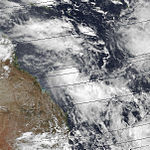1985–86 Australian region cyclone season
| 1985–86 Australian region cyclone season | |
|---|---|

Season summary map
|
|
| Seasonal boundaries | |
| First system formed | 26 November 1985 |
| Last system dissipated | 22 May 1986 |
| Strongest storm | |
| Name | Victor |
| • Maximum winds | 210 km/h (130 mph) (10-minute sustained) |
| • Lowest pressure | 930 hPa (mbar) |
| Seasonal statistics | |
| Tropical lows | 17 |
| Tropical cyclones | 16 |
| Severe tropical cyclones | 8 |
| Total fatalities | 153 |
| Total damage | $250 million (1986 USD) |
| Related articles | |
| Category 4 severe tropical cyclone (Australian scale) | |
| Category 1 tropical cyclone (SSHWS) | |
| Duration | November 26 – December 7 |
|---|---|
| Peak intensity | 185 km/h (115 mph) (10-min) 945 hPa (mbar) |
| Tropical depression (SSHWS) | |
| Duration | December 12 – December 16 |
|---|---|
| Peak intensity | 55 km/h (35 mph) (1-min) 1000 hPa (mbar) |
| Category 2 tropical cyclone (Australian scale) | |
| Tropical storm (SSHWS) | |
| Duration | January 7 – January 12 |
|---|---|
| Peak intensity | 95 km/h (60 mph) (10-min) 986 hPa (mbar) |
| Tropical storm (SSHWS) | |
| Duration | January 11 – January 14 |
|---|---|
| Peak intensity | 65 km/h (40 mph) (1-min) 997 hPa (mbar) |
| Category 2 tropical cyclone (Australian scale) | |
| Tropical storm (SSHWS) | |
| Duration | January 17 – January 24 |
|---|---|
| Peak intensity | 95 km/h (60 mph) (10-min) 973 hPa (mbar) |
| Category 3 severe tropical cyclone (Australian scale) | |
| Tropical storm (SSHWS) | |
| Duration | January 18 – January 21 |
|---|---|
| Peak intensity | 120 km/h (75 mph) (10-min) 976 hPa (mbar) |
| Category 1 tropical cyclone (Australian scale) | |
| Tropical storm (SSHWS) | |
| Duration | January 21 – January 24 |
|---|---|
| Peak intensity | 80 km/h (50 mph) (10-min) 990 hPa (mbar) |
| Category 3 severe tropical cyclone (Australian scale) | |
| Category 2 tropical cyclone (SSHWS) | |
| Duration | January 27 – February 5 |
|---|---|
| Peak intensity | 125 km/h (80 mph) (10-min) 957 hPa (mbar) |
| Category 3 severe tropical cyclone (Australian scale) | |
| Tropical storm (SSHWS) | |
| Duration | February 17 – February 21 |
|---|---|
| Peak intensity | 140 km/h (85 mph) (10-min) 968 hPa (mbar) |
The 1985–86 Australian region cyclone season was an above average tropical cyclone season. It officially started on 1 November 1986, and officially ended on 30 April 1987.
Tropical Cyclone Nicholas originated from a broad area of low pressure associated with a monsoonal trough south of Sumatra on November 25. It tracked south and gradually organized itself and became a tropical cyclone early on November 29. It then began to move east and passed through major shipping routes near Christmas Island, though none of the ships record any extensive winds from the nearby cyclone. Nicholas, while remaining a small system, continued to intensify and by December 3 reached a peak intensity as a category four cyclone with winds of 115 mph (185 km/h) 10-min sustained and a pressure of 945 hPa. Afterwards the cyclone turned almost directly south and gradually weakened. On December 7 the Nicholas's convection began to wane and the system had fully dissipated by that evening.
Tropical Cyclone 03S existed from December 11 to December 14.
Tropical Cyclone Ophelia occurred from 7 January until 12 January 1986 near Cocos Island. Its estimated lowest pressure was 985 hPa.
Tropical Cyclone 08S existed from January 11 to January 14.
Tropical Cyclone Hector occurred from 17 January until 24 January 1986. It crossed the coast near Wyndham, Western Australia and its estimated lowest pressure was 973 hPa. Hector caused significant flooding in the Kimberley region of Western Australia.
Tropical Cyclone Pancho occurred from 18 January until 22 January 1986 and remained entirely within the Indian Ocean off Western Australia. Its estimated lowest pressure was 976 hPa.
Vernon was a weak cyclone that occurred from 21 January until 24 January 1986 and formed in the Gulf of Carpentaria. It crossed Cape York and continued on into the Coral Sea. Its estimated lowest pressure was 990 hPa.
The precursor tropical low to Severe Tropical Cyclone Winifred was first observed on 27 January, about 450 km (280 mi) north of Cairns, Queensland. Initially drifting toward the east, the low pressure system showed signs of slow development. Early on 29 January, the system turned south as it gradually continued to gain in strength. Based on data from the GMS, the low had become sufficiently well-organized to be classified as a tropical cyclone by 30 January, retaining a minimum central pressure of 995 mbar (hPa; 29.38 inHg). Accordingly, the system was assigned the name Winifred at 1400 UTC that same day, as it slowly proceeded southward.
...
Wikipedia
















